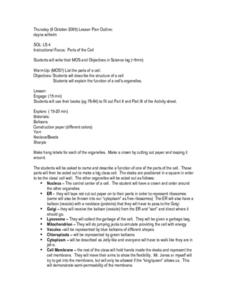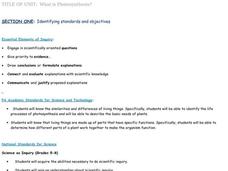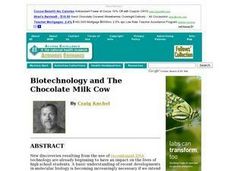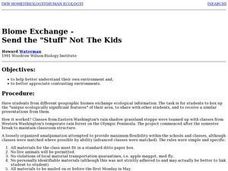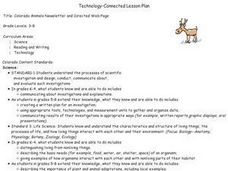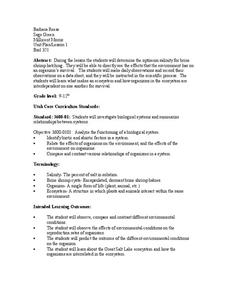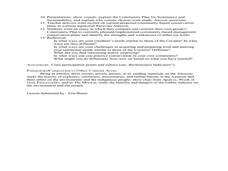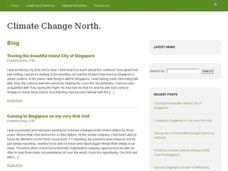Curated OER
"Publication" of Scientific Papers And Posters
Students create and display a scientific poster in the same format that scientists use at a research symposium. They compile data and make conclusions about the classification of the Arizona Hedgehog Cactus as an endangered species. ...
Agriculture in the Classroom
Roll of the Genes
Animal reproduction in sheep and cattle is explored with the help of Punnet squares. Scholars employ tools using probability to conclude the color of wool a sheep's offspring will have. Acting as animal geneticists, pupils then take...
Curated OER
Parts of the Cell
Students examine plant and animal cells to observe the organelles present in the cell, to match the function of each to the organelle on a cell model and to build a model of the plant or animal cell.
Curated OER
If It Smells Good, Is Edible, and Attracts Wildlife, Then It's a Practical Garden
Students explore landscape design. In this practical gardening lesson, students design landscape plans that call for shrubs, trees, and plants that can be used for aesthetics, cooking, and wildlife.
Curated OER
WHAT IS A CELL?
Students explore the function and structures of cells, including plant and animal cells. They explore cell parts including cell wall, ribosomes, chromosomes, nucleoid, plasmids, flagella, pilli, and plasma membrane, cel
Curated OER
Field Experiments on Succession
Student develop a hypothesis regarding the effects of either mowing or fertilizer upon the diversity of plant species in a grassland ecosystem. They set up experiment field plots and measure species richness.
Curated OER
What is Photosynthesis?
Students investigate the similarities and differences of living things. Specifically, students will be able to identify the life processes of photosynthesis and describe the basic needs of plants.
Curated OER
City Wildlife in a Vase
Young scholars examine a still-life painting. They discuss the observation of nature by scientists and artists and explore the symbolism of biological life cycles depicted in a painting.
Curated OER
Biosphere II
Learners continue their examination of the existence of life on Earth. In groups, they determine the role of the water cycle and other biogeochemical cycles play in keeping balance on Earth. They participate in experiments to discover...
Curated OER
Biotechnology and The Chocolate Milk Cow
Students discuss new discoveries that have resulted from the use of recombinant DNA technology and otehr biotechnology. In groups, they create a transgenic cow capable of producing chocolate-flavored milk.
Curated OER
Biome Exchange - Send the "Stuff" Not The Kids
Students exchange ecological information with students from different geographic biomes. They box up the "unique ecologically significant features" of their area, send the box to another class in another area and then receive a similar...
Curated OER
Colorado Animals Newsletter and Directed Web Page
Students select a Colorado animal, develop a Directed Web page, and research their animal. Each member of the group combine their research and develop a Newsletter.
Curated OER
Hatching Brine Shrimp
Third graders investigate the environment that is considered favorable for brine shrimp hatching. The salinity level is of particular interest in the observations because the optimum level is needed for survival. They make daily...
Curated OER
Supermarkets, Sustenance and Sustainability
Students investigate jungles and the people who depend upon them. In this sustainability lesson, students research wild life conservation and discover the importance of a jungle to Amazonian people. Students create a group...
Curated OER
How is Rice Harvested?
Second graders look at how rice is harvested. In this rice harvesting lesson plan, 2nd graders learn vocabulary associated with rice harvesting. They read or listen to a study guide before making Squishy Rice Balls from balloons and rice.
Curated OER
Nature and Fintess Trail
High schoolers investigate how humans impact the environment and compile an organism database into an e-book field guide. They name muscle groups and develop specific exercises to strengthen these groups. Students utilize technology for...
Curated OER
Terraqua Column
Sixth graders create a TerrAqua column. In this ecosystems lesson, 6th graders build a TerrAqua column to conduct investigations on how living things impact the ecosystem.
Curated OER
Climate Change Challenge
Students explore the issue of climate change through participation in an interactive game show. They explore climate change issues in the news. Students write and discuss their own questions about climate change.
Curated OER
Introduction to Mendelian Genetics using Fiction
Students investigate Mendelian Genetics by studying the history of Mendel and what it was like to be a 19th century scientist. They read a pieces of fiction during this investigation.
Curated OER
Biome Exchange: Send the Stuff Not The Kids
Students exchange information with students from various geographic biomes. They explore the unique ecologically significant features of the biomes and share with other students.
Alabama Learning Exchange
Alex: The Circles of Life
This is an inquiry based cooperative learning unit that can be used in biology as a graduation exam review or in botany for a nine week project. The students will learn the life cycle of mosses, ferns, gymnosperms and angiosperms. The...




